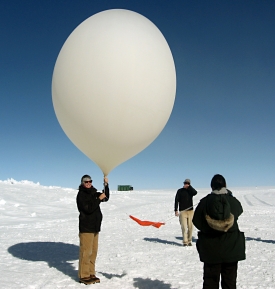NSF selected five high-school students from as many states nationwide to deploy to the Arctic this summer as part of a science-education and cultural-exchange program with their peers from Denmark and Greenland.
The students will participate in a three-week field experience in Greenland as part of the multinational Joint Science Education Project (JSEP). The U.S. students were selected in a competitive process that drew 375 applications from all 50 states as well as Department of Defense schools abroad.

The 2013 U.S. JSEP participants are:
Samuel Blair, an 11th-grader from Massachusetts.
Chloe Fouilloux, an 11th-grader from Minnesota.
Samantha Montoya, a 10th-grader from New Mexico.
Ronin Ruerup, a 10th-grader from Alaska.
Grace Wischmeyer, an 11th-grader from Illinois.
JSEP, which began as an offshoot of the International Polar Year (IPY), reflects NSF's emphasis on the interaction between research and education as well as the close relationship between the participating nations needed to conduct field science in the remote and often harsh climate of Greenland. It is now in its sixth season.
JSEP is designed to allow students to work cooperatively on science projects and to work with researchers in the field. The 2013 program begins in early June. The first two weeks are conducted at the Kangerlussuaq Science Field School run by the Greenlandic government. During that session students will conduct their own measurements and interact with scientific parties, many supported by NSF and other U.S. science agencies.
A smaller group of students from the three nations then will spend several days during Science Education Week visiting NSF's Summit Station on the Greenland ice sheet, meeting with researchers there and observing long-term experiments related to snow- and ice-chemistry and atmospheric phenomena.
Kasper Busk and Lynn Foshee Reed, teachers from Denmark and the U.S., respectively, will work cooperatively during Field School. Reed, an Albert Einstein Distinguished Educator Fellow in the NSF Division of Polar Programs, will lead the Science Education Week.
For more information about JSEP and the 2013 program, see the NSF press release or Witness, Fall 2012 or contact Lynn Foshee Reed (lreed [at] nsf.gov).
